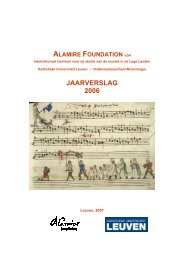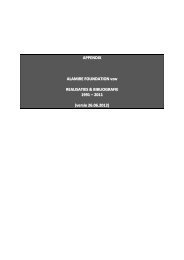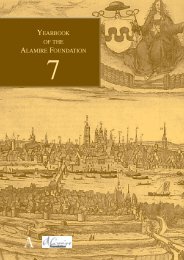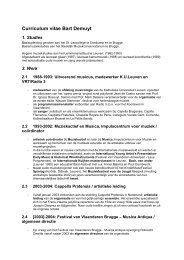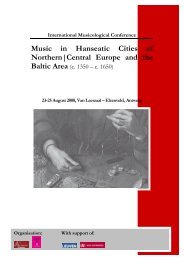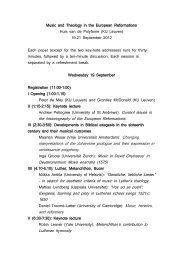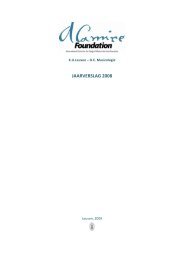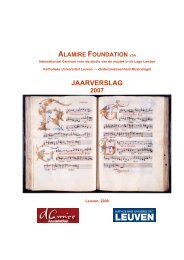YEARBOOK OF THE ALAMIRE FOUNDATION
YEARBOOK OF THE ALAMIRE FOUNDATION
YEARBOOK OF THE ALAMIRE FOUNDATION
You also want an ePaper? Increase the reach of your titles
YUMPU automatically turns print PDFs into web optimized ePapers that Google loves.
162 RICHARD FREEDMAN<br />
prints, but by persuading them that the contrafacta books are ‘superior’ to those<br />
models, the contents of which have been made ‘authentic’ by virtue of the devotional<br />
purposes now recovered for Lasso’s music. For these editors, music was a divine gift,<br />
beyond the claims of individual property.<br />
This editorial troping of other printed books was neither new nor unique to the<br />
Huguenot appropriation of Lasso. Indeed, from its very outset the Calvinist enterprise<br />
of making chansons spirituelles and contrafacta of secular chansons was selfconsciously<br />
dependent upon printed books. It is worth noting, however, that Goulart’s<br />
claims for the superiority of his Lasso contrafacta books were made at a time when<br />
Lasso himself commanded considerable prestige in France. Lasso’s stature as a composer<br />
grew steadily during the 1560s, thanks in large measure to the efforts of his<br />
printer and friend, Adrian Le Roy. By the middle years of that decade, Lasso’s name<br />
came to be prominently featured on the title pages of chanson anthologies issued in<br />
Paris by Le Roy and his partner Robert Ballard, eclipsing that of Jacques Arcadelt,<br />
who had previously held pride of place in those titles. Le Roy’s official royal privilege<br />
of commercial protection, granted by the French King Charles IX in 1567, reflects<br />
this new stature, putting Lasso at the head of a long list of composers whose music<br />
was deemed particularly worthy of publication (see Appendix, Document 1). 5<br />
As a brief aside, it is important for us to recall that at this juncture in the history<br />
of the French book trade, Parisian printers in particular operated in an environment<br />
of increasing official oversight and centralization. Following the Edict of Moulins in<br />
1566, French printers were in fact required by law to obtain a royal privilege for the<br />
publication of each new work and were also required to allude to such privileges on<br />
their printed books (see Appendix, Document 2). Such legislation was apparently<br />
inspired by dual purposes: to protect printers from unfair competition and to censor<br />
seditious political or religious expression. The Edict also had the effect of eliminating<br />
the Parlement de Paris as a source of privileges, ending a decades old practice in<br />
which printers could petition for commercial protection from any of several institutions<br />
there. In brief, Le Roy et Ballard’s general privilege of 1567 reminds us that by<br />
5 Quoted from the last page of the Bassus partbook of Primus liber modulorum quinis vocibus constantium,<br />
Orlando Lassusio auctore, Paris, 1571. A Latin epistle to King Charles IX, extolling the special<br />
virtues of Lasso’s music appears in each of the five partbooks of this set. The general privilege of 1567<br />
also appears in a number of other Le Roy et Ballard publications devoted exclusively to the music of<br />
Lasso, including Secundus liber modulorum Quinis vocibus constantium Orlando Lassusio auctore<br />
(1571), Novem quiritationes divi Iob. Quaternis vocibus ab Orlando de Lassus (1572), and Moduli<br />
nondum prius editi monachii Boioarie ternis vocibus (1576). Further on the general privilege of 1567,<br />
see W. BOETTICHER, Orlando di Lasso und seine Zeit, 1532–1594, rev. ed., 2 vols., Wilhelmshaven,<br />
1998, 2, p. 481; and F. LESURE and G. THIBAULT, Bibliographie des éditions d’Adrian Le Roy et<br />
Robert Ballard, 1551–1598, Paris, 1955, p. 12. A different general privilege, conferred by Henry IV<br />
upon Pierre Ballard, appears in Ballard’s choirbook editions of some masses by Lasso, Missa ad imitationem<br />
(1607) and Missa ad imitationem moduli ‘Credidi’ auctore Orlando de Lassus, cum quinque<br />
vocibus (1608). This privilege makes no special mention of individual composers.



